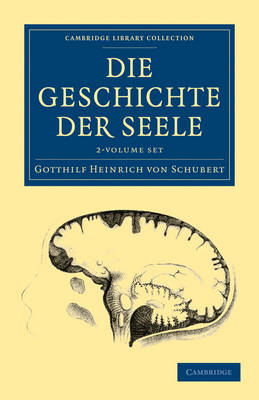Cambridge Library Collection - Spiritualism and Esoteric Knowledge
2 primary works • 4 total works
Volume 1
This is the fourth, revised and expanded 1850 edition of an influential two-volume work originally published in 1830 by the German scientist and philosopher Gotthilf Heinrich von Schubert (1780–1860). Schubert studied theology and medicine, and taught natural history at Erlangen and Munich, specialising in botany, forestry and mineralogy. He also lectured on topics including animal magnetism, clairvoyance and dreams, and attempted to reconcile Enlightenment philosophy with Christian faith. This book presents Schubert's views on human nature as body, soul and spirit, and on humankind's place in the natural order. Volume 1 introduces Schubert's ideal of a harmonious balance between opposing forces, contrasting the animate and the inanimate and describing the mineral, vegetable and animal kingdoms and their interactions. It then focuses on human anatomy and physiology, and discusses the senses, heredity, sleep and death, and the differences between humans and other animals.
Volume 2
This is the fourth, revised and expanded 1850 edition of an influential two-volume work originally published in 1830 by the German scientist and philosopher Gotthilf Heinrich von Schubert (1780–1860). Schubert studied theology and medicine, and taught natural history at Erlangen and Munich, specialising in botany, forestry and mineralogy. He also lectured on topics including animal magnetism, clairvoyance and dreams, and attempted to reconcile Enlightenment philosophy with Christian faith. This book sets out Schubert's views on human nature as body, soul and spirit, and on humankind's place in the natural order. Volume 2 focuses mainly on the 'soul', which Schubert differentiates from the 'spirit' that clothes and feeds it. The discussion ranges from hypnosis and clairvoyance to moods and feelings, passions and affects, the unconscious and personality disorders. Schubert refers frequently to Classical and early Christian philosophers as he probes phenomena now assigned to psychology, including cognition and discernment.
The German scientist and philosopher Gotthilf Heinrich von Schubert (1780–1860) studied theology and medicine, but gave up his medical practice to teach natural history at Erlangen and Munich, specialising in botany, forestry and mineralogy. He also gave public lectures on topics including animal magnetism, clairvoyance and dreams, and strove to develop an understanding of the cosmos that could reconcile Enlightenment philosophy with Christian faith. This 1814 study of the symbolism of dreams was highly regarded in its day, and its influence extended to the works of Freud and Jung nearly a century later. Schubert considers the working of the mind in the state between waking and sleeping, and proposes that dreams and their symbols, not being bound by language, are universally comprehensible. His book focuses mainly on those dreams that, in his view, lead to prophetic insights and an experience of the divine presence.
This is the fourth, revised and expanded 1850 edition of an influential two-volume work originally published in 1830 by the German scientist and philosopher Gotthilf Heinrich von Schubert (1780-1860). Schubert studied theology and medicine, and taught natural history first at Erlangen, from 1819, and later at Munich, specialising in botany, forestry and mineralogy. He also lectured on topics including animal magnetism, clairvoyance and dreams, and attempted to reconcile Enlightenment philosophy with Christian faith. This book presents Schubert's views on human nature as body, soul and spirit, and on humankind's place in the natural order. Volume 1 introduces Schubert's ideal of a harmonious balance between opposing forces, contrasting the animate and the inanimate and describing the mineral, vegetable and animal kingdoms and their interactions. It discusses human anatomy and physiology, while Volume 2 focuses on the 'soul' and discusses psychological phenomena including moods and feelings, cognition and personality.

